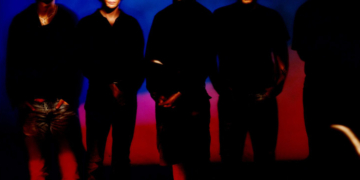The recent announcement by Across The Line (ATL) presenter Gemma Bradley that the BBC Radio Ulster show would be going on hiatus marks a sad day for the Northern Ireland music scene. ATL may have started out as a radio show but over the course of its 39 year run, it ultimately became an institution.
The ATL website carried news stories, reviews of shows & releases while its gig guide was the definitive listings for live music. There was also the oft forgotten ATL TV and their TV version of battle of the bands, ATL Rock School. It inspired countless people to become musicians, set up bands and release music and if you review the album notes/credits from many local releases over the last thirty plus years, you’ll probably find they get a mention. A play on ATL was worth its weight in gold for countless artists in Northern Ireland.
It kickstarted the careers of many aspiring broadcasters, Mike Edgar, Phil Taggart, Rigsy, Stuart Bailie and more recently Gemma Bradley and Aine Cronin-McCartney. While many other producers and contributors worked for or had their contributions featured on the show or on the website.
Yet the end of the show isn’t a surprising one. While ATL used to be the premier place to discover the freshest new music and happenings in the scene, recent years has seen its influence and ambition on the decline.

In the banking world, there are regular claims when branches close that it is because people aren’t using them as much. A perfectly reasonable explanation on the face of it but when you dig deeper and realise the banks have deliberately made it difficult to access their services (closing at lunchtime, delayed morning openings, early closing times and no access at the weekends), it is clearly orchestrated.
In a similar vein, ATL’s offering has been slowly and systemically whittled down to a husk of its former self. From the reduction in the show’s air time, the loss of their traditional broadcasting slot, the gig guide only focusing on bigger venues/commercially successful artists and the cessation of their online content/blog.
Across the Line uncovered a heap of brilliant artists over the years and offered artists the incredible opportunity to hear their music played on the radio. Its support and development of new music and artists dwindled with the reduced runtime of less than an hour. By the time you factored in a three track live session and the odd interview, it only left room for a handful of tracks. Most of those were typically filled by more established artists with the show seeming to favour following the latest trends rather than trying to set them.
Another contributing factor to the decline and a self-inflicted one at that, was the withdrawal from all social media except for Instagram (itself only created in 2020) at the start of 2021. While we know the pain of running multiple social media channels, a significant and engaged audience was lost from Facebook and Twitter overnight. As a result, the usual stream of celebratory posts from musicians following each show gradually disappeared from our timelines until there was no real online reminder the show was broadcasting each week.
The decision makers at the BBC shouldn’t be surprised if engagement and listener numbers fell following these changes and never recovered. The old adage “if it aint’ broke, don’t fix it” comes to mind with their handling of this iconic brand.
Another source of contention and debate for the show in recent years was that the playlist under the new hour-long format was the loss of focus on artists from the North by bringing in more music from Ireland as whole. Under the old two hour format, there were plenty of artists from the South featured but they were interspersed among a predominantly Northern based track list. Under the shorter airtime of the show, this was to the detriment of the local scene.
On mainstream radio, Northern Ireland really only has ATL as a dedicated show for local music. Of course Radio Ulster stalwarts like Stephen McCauley, Ralph McClean & Eve Blair play their fair share of local artists but it isn’t enough. Outside of the BBC, there are a few passionate local music supporters like Chris Barber’s Lock In Local on Blast 106 and on Q Radio both Olga Kinsman and Cushlá Rice play the odd local artist.
This squeeze on coverage for artists already struggling for opportunities feels like a hammer blow and a missed opportunity for BBC NI to demonstrate its support for our burgeoning music scene. While it is well known that the music industry is ruthless, it doesn’t send a particularly inspiring message to local musicians if they can’t even get a play on their local BBC station on the show specifically designed to promote grass roots talent.
How are we going to produce the next Snow Patrol, Foy Vance, Therapy?, Ash, if our own publicly funded radio station can’t dedicate one hour a week out of its schedule to champion new artists. Would the likes of SOAK, General Fiasco, Two Door Cinema Club, ASIWYFA, Mojo Fury, More Than Conquerors have reached the heights they did, without the early support of ATL?

The top brass will likely point to the ‘local music matters’ list which guarantees local artists plays across a variety of shows on the whole Radio Ulster station but in reality that was happening previously and just wasn’t publicised to the same degree.
Joe Dougan (Shine, Belsonic, CHSq, Limelight) was asked at at the NI Music Prize within the last few years what was the main factor in who his team booked for shows; his answer was radio airplay. With fewer artists (particularly those less established) able to secure radio plays, it doesn’t bode well for their chances on getting booked for shows either.
It wasn’t all doom and gloom in recent years though. There were still plenty of highpoints, in particular the success of their tie-in with Stendhal and the live broadcasting from the festival was fantastic. From live sessions and interviews even curating stages, the recent iterations of Stendhal had the ATL ingrained into their foundations. ATL was also the reason many of our local artists got to play at festivals like Reading & Leeds and Big Weekend, hopefully this won’t be lost alongside ATL.
Who could forget their 30th anniversary celebration in the Ulster Hall with sets from Therapy?, Divine Comedy, Saint Sister, R51, SOAK, The 4 Of Us and Villagers. Or their live broadcasts from the Northern Ireland Music Prize and the biggest local music showcase curated by Snow Patrol in Ward Park. ATL also wasn’t restrictive on genre and certainly under Gemma’s tenure the show did try to evolve from its roots, and increasingly covered the growing electronic and dance scene.
The loss of the show will also have a financial impact on artists. Plays on the BBC generate quite solid royalty rates and while one or two plays will certainly not be enough to let you quit the rat race, it was useful for musicians to fund the next release or tour. More importantly it gave artists hope that they could build on that initial achievement and kick on with their music career. This puts into start contrast the changes to income potential for musicians in the streaming era, where artists would need potentially tens of thousands of streams on the likes of Spotify to generate a similar return.
Change is always difficult to process but the thing that stings the most about the ATL situation is the lack of fan fare or even recognition given to the show as it bows out. ATL was the longest running music programme of it’s sort on the BBC. Not just Radio Ulster but the entire BBC covering both radio or television. You can be sure when Nolan or Hugo Duncan retire, there’ll be coverage for months in the run up but for ATL, the BBC did nothing and and let the show drift off into the night with a whimper. Not what the team who worked on the show over the years deserved and certainly not what a show spanning nearly 40 years deserves, shame on them.
Perhaps the reason for our concern is that this hiatus is part of a larger trend where media outlets and publications that have proved instrumental in supporting the arts are disappearing and not being replaced. If the well funded and resourced BBC can’t sustain a small team for a weekly show, it is worrying what might happen to other less financially stable outlets.
With less outlets and publications showcasing new music, combined with reduced arts funding in general and grass roots venues closing, it will become harder and harder for artists to be heard and breakthrough. We need advocates for new music and therefore we can only hope that the outpouring of support for the show gives the BBC pause for thought. In an ideal world, ATL will be brought back swiftly with a renewed vigour and without the recent constraints and cut backs that brought about its slow death in the first place.

The last Across the Line show was broadcast on Friday 2nd May 2025 and is available to listen to on BBC Sounds.
You can search through all the old Across the Line archives from 2009 right up to 2023 over on the ATL blog.
There are a host of old live sessions available from the show on the BBC Northern Ireland youtube channel.
From all of us at Chordblossom, we wish Gemma and the whole ATL team the best of luck for the future!
For those looking to fix that ATL shaped hole in their lives, we’ve a few suggestions.
Our Fresh Music From Northern Ireland playlist is updated monthly with the hottest releases from these shores. The last few months have had 30-40 new tracks, showcasing the strength of the music scene here.
The Thin Air continue to celebrate local music via their weekly Irish Tracks of the Week feature.
Alongside us golden oldies, there are also new platforms and new faces emerging to champion artists like NuMuze and Girls With Guts NI.
We are also thrilled to hear that Taylor Johnson will be hosting a new Introducing show as part of the new schedule and we’re sure we’ll see plenty of new local artists featured.








